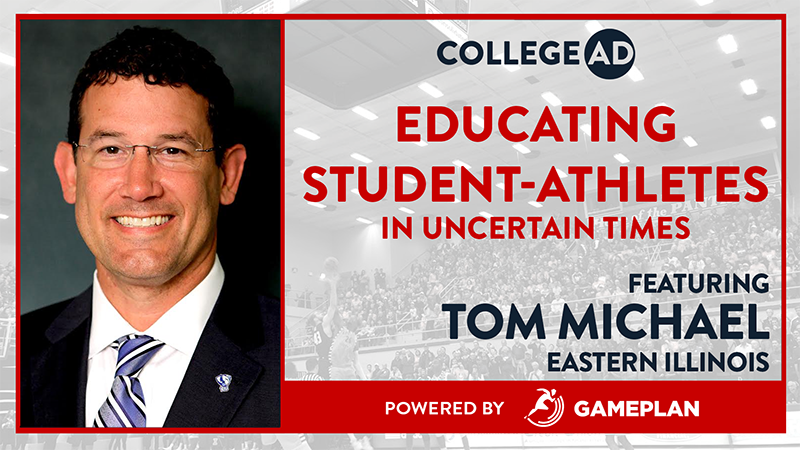 “My experience as a student-athlete, without any doubt, gave me an opportunity to prepare for this career. Being able to do this, to know the Student-Athlete experience from the academic or sports side of things, allowed me to relate better to what they go through on a daily basis.” -Tom Michael
“My experience as a student-athlete, without any doubt, gave me an opportunity to prepare for this career. Being able to do this, to know the Student-Athlete experience from the academic or sports side of things, allowed me to relate better to what they go through on a daily basis.” -Tom Michael
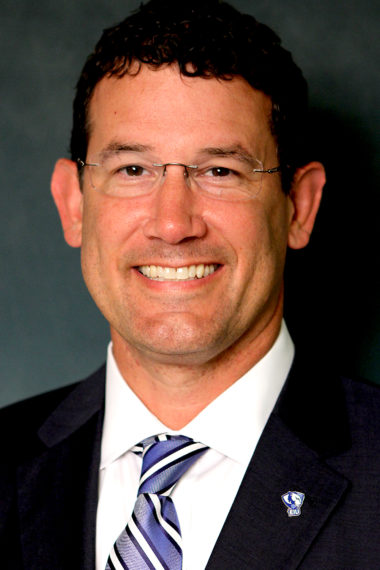 Tom Michael is in his seventh year as Director of Athletics for Eastern Illinois. In his time as the head of the department, he and his team have come to see the student-athlete experience as paramount to what they are doing at Eastern Illinois; helping in all facets of department life, from winning on the field to excelling in the classroom. Michael says his experience as a college athlete helps him to relate to their everyday lives.
Tom Michael is in his seventh year as Director of Athletics for Eastern Illinois. In his time as the head of the department, he and his team have come to see the student-athlete experience as paramount to what they are doing at Eastern Illinois; helping in all facets of department life, from winning on the field to excelling in the classroom. Michael says his experience as a college athlete helps him to relate to their everyday lives.
“When I talk to them from a place of experience, they know I’m not talking out the side of my head. I’ve been where they are, I’ve walked in their shoes. It allows for a little bit of instant credibility. It isn’t always, ‘I’m struggling in my sport’ they may come to you with issues in the classroom or with a teammate, and they know I understand. Because I’ve been there.”
He explains it’s not only his experience as a student-athlete that helps him relate to his athletes, his children are also student-athletes in their universities. He’s had firsthand experience watching them navigate through the pandemic, juggling online classes, and trying to get through workouts safely.
“I can see how the mental health side of things really comes into play right now. It gave me a really good perspective in regards to that as well. Some things have changed, but the experience of what it’s like balancing between being a student and an athlete is the same. We still had time management issues to overcome, there are still components they have to deal with on the athletic and academic side of things.”
Part of what he likes to stress to his student-athletes is that they will never ask for them to put sports before academics or vice versa. Tom Michael views all parts of the student-athlete experience as valuable components to the whole person.
“Kids may have changed over the years, but the student-athlete component is still there. Being part of a team, being coachable, what that means to their future. It’s all part of the Bigger Picture.”
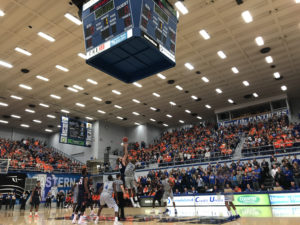 Michael understands that a notable student-athlete experience at Eastern Illinois translates to more than just a fulfilling time for their athletes. It impacts every part of their department from recruits to fundraising and overall engagement of the community and fans.
Michael understands that a notable student-athlete experience at Eastern Illinois translates to more than just a fulfilling time for their athletes. It impacts every part of their department from recruits to fundraising and overall engagement of the community and fans.
“The student-athlete experience is the focal point of everything we do. I wouldn’t be doing this today if the student-athlete experience here wasn’t one that says ‘I want to have an impact.’ I’m in a position where I can provide a vision and mission for them to be better prepared to be successful when they leave. The student-athlete experience is what drives our decision making. Whether that is how we interact with the community, whether that’s our fundraising efforts, it is always about, ‘how can we work to continue to enhance that experience.”
He says one of the things he tells parents of recruits is “we got to give them back better then we got them.”
“This is something we talk to our coaches about frequently, these parents are entrusting their son or daughter with us for the next four or five years. We have to take seriously how important it is to give them back better; we have to make them better young men and young women and make sure they are prepared to be successful when they leave Eastern Illinois. At the end of the day, that student-athlete experience may potentially lead to them being our best recruiters.”
Tom Michael explains that right now sponsors are looking to align themselves with the student-athlete experience, the feel-good element of an inspiring story can engage on a human level.
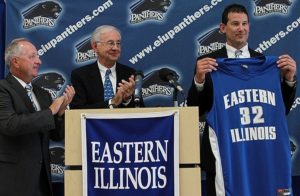 “It’s a great story to tell, the student-athlete experience has an impact for the rest of your life. These stories are a great way to tell the larger community who your athletes really are and what you are all about.”
“It’s a great story to tell, the student-athlete experience has an impact for the rest of your life. These stories are a great way to tell the larger community who your athletes really are and what you are all about.”
He says that hiring the right people is one of the most important responsibilities that he has; building a team of coaches that truly get his vision on the student-athlete experience is paramount.
“It’s important to align yourself with people that have like-minded philosophies and some of that goes back to how they value the student-athlete experience. I’ve talked to our coaches recently about this, I told them, ‘it’s ok to coach your athletes hard, but what is equally as important is that you are able to praise them and express how much you care about them as well.’ We have to understand what our student-athletes are thinking and adjust our coaching philosophies around that.”
He explains that even though the country is in the midst of a pandemic, the student-athlete experience cannot take a back seat.
“Very quickly I challenged our staff to figure out a way to come out of this pandemic in a better place; if we don’t think that way, we are going to get run over. Now, I never thought I’d say that in March and we’d still be going through it in October, but we are. I challenged my staff to have the best semester academically. In theory, we just gained a ton of academic counselors. All of our coaches now became academic counselors, we’re not having practices and competitions that occupy their time. Now we can solely concentrate on academics and we had a record semester.”
Tom Michael also talked with his recruiting staff about how to continue their forward momentum and not lose ground during the downtime.
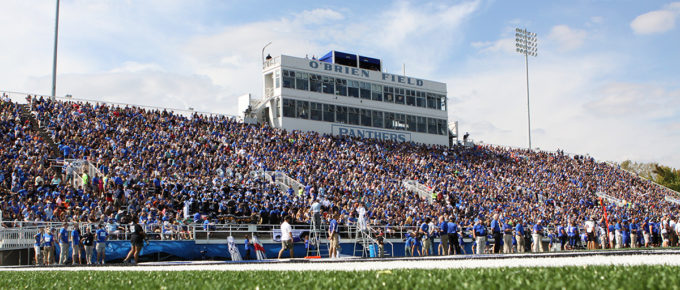 “The coaches have done a really good job, with the help of campus, on managing these virtual visits. That was our approach, to do what we can to not lose ground and even come out better on the other side. We started getting all of our coaches on a Zoom call, now all of a sudden, the football coach is hearing from the baseball coach, the volleyball coach is talking with the golf coach. You had these interactions and in a really weird way virtually through their screens got to know each other a little better. That I think is a positive as we move forward coming back to campus.”
“The coaches have done a really good job, with the help of campus, on managing these virtual visits. That was our approach, to do what we can to not lose ground and even come out better on the other side. We started getting all of our coaches on a Zoom call, now all of a sudden, the football coach is hearing from the baseball coach, the volleyball coach is talking with the golf coach. You had these interactions and in a really weird way virtually through their screens got to know each other a little better. That I think is a positive as we move forward coming back to campus.”
He says the pandemic highlighted challenging times but also showcased the strength of their department and the importance of communication.
“It’s really forced us to lead in a unique way. So many times, as the athletic director, you’re supposed to have all of the answers, during these times we had to respond with, ‘I’m not sure yet.’ It provided us an opportunity to be transparent and patient. That’s a unique way because in some ways it can show some vulnerability, but it’s really just me being transparent with my staff. The reality is that’s the way we should be moving like that all the time. I told them our success might really be defined by our ability to be flexible.”
